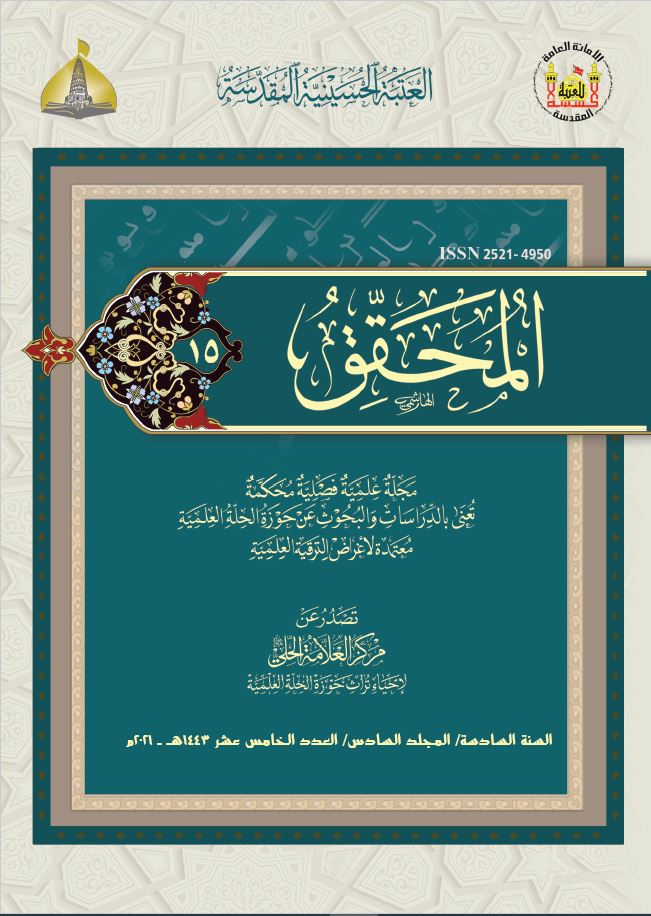Abstract
Research hypothesis: The research starts from a major assumption that the Qur’anic discourse is a (Value) discourse, which can be employed (the Value system); to re-read (the abrogation) – alleged- in the Qur'an.
The implication of this matter is that the Qur’anic discourse is copious of values, and in other words, the sum of its letters represents a set of values, which put them forward in a special way; and the punishment was inflicted against those who violate them, in order to achieve human, intellectual, societal and mental security. If we contemplate the humanitarian values in the verses allegedly abrogated, we would find in that the Qur’an set a letter to handle the punishment against those who violated those values, but it excluded those of them who repented. The ruling remained in effect against those who did not repent, and it was removed from those of them who repented. This is a specification, or a reduction of the circle of the ruling, not abrogation as it is claimed, or it was a term for the forerunners, and perhaps those who came after them followed their path; but it is not from the act of abrogation.
The implication of this matter is that the Qur’anic discourse is copious of values, and in other words, the sum of its letters represents a set of values, which put them forward in a special way; and the punishment was inflicted against those who violate them, in order to achieve human, intellectual, societal and mental security. If we contemplate the humanitarian values in the verses allegedly abrogated, we would find in that the Qur’an set a letter to handle the punishment against those who violated those values, but it excluded those of them who repented. The ruling remained in effect against those who did not repent, and it was removed from those of them who repented. This is a specification, or a reduction of the circle of the ruling, not abrogation as it is claimed, or it was a term for the forerunners, and perhaps those who came after them followed their path; but it is not from the act of abrogation.
Keywords
Abrogation
Array
Re-read
Values
Abstract
فرضيَّة البحث: إنَّ البحث ينطلق من فرضيَّة كبرى مفادها أنَّ الخطاب القرآنيّ خطابٌ (قيميّ)، يمكن أنْ يُوظَّفَ (المنظومة القيميَّة)؛ لإعادة قراءة (النَّسخ)- المدَّعى- في القرآن.
ومفادُ هذا الأمر أنَّ الخطاب القرآنيّ زاخر بالقيم، وبعبارةٍ أخرى مجموع خطاباته تمثّل مجموعة قيم، طرحها بطريقة خاصَّةـ وأنزل الجزاء بحقِّ من ينتهكها، تحقيقًا للأمن الإنسانيّ، والفكريّ، والمجتمعيٍّ والعقليّ...ولو تأمَّلْنا القيم الإنسانيَّة في الآيات المدَّعى نسخها لوجدْنا أنَّ القرآن ينزلُ خطابًا يتناول الجزاء بحقِّ الَّذينَ انتهكُوا تلك القيم، لكنَّه استثنى من تاب منهم، فالحُكْم بقي ساريًا بحقِّ من لم يتُبْ، ورُفِعَ عمَّن تابَ منهم، فهذا تخصيص، أو تقليص لدائرة الحُكْم، لا نسخَ كما يُدَّعى، أو كانَ مصطلحًا عند المتقدِّمينَ، ورُبَما سارَ على نهجهم منْ جاءَ بعدهم؛ لكنَّه ليس من حدِّ النَّسخ.
ومفادُ هذا الأمر أنَّ الخطاب القرآنيّ زاخر بالقيم، وبعبارةٍ أخرى مجموع خطاباته تمثّل مجموعة قيم، طرحها بطريقة خاصَّةـ وأنزل الجزاء بحقِّ من ينتهكها، تحقيقًا للأمن الإنسانيّ، والفكريّ، والمجتمعيٍّ والعقليّ...ولو تأمَّلْنا القيم الإنسانيَّة في الآيات المدَّعى نسخها لوجدْنا أنَّ القرآن ينزلُ خطابًا يتناول الجزاء بحقِّ الَّذينَ انتهكُوا تلك القيم، لكنَّه استثنى من تاب منهم، فالحُكْم بقي ساريًا بحقِّ من لم يتُبْ، ورُفِعَ عمَّن تابَ منهم، فهذا تخصيص، أو تقليص لدائرة الحُكْم، لا نسخَ كما يُدَّعى، أو كانَ مصطلحًا عند المتقدِّمينَ، ورُبَما سارَ على نهجهم منْ جاءَ بعدهم؛ لكنَّه ليس من حدِّ النَّسخ.
Keywords
نسخ، قيم، منظومة، إعادة، قراءة
